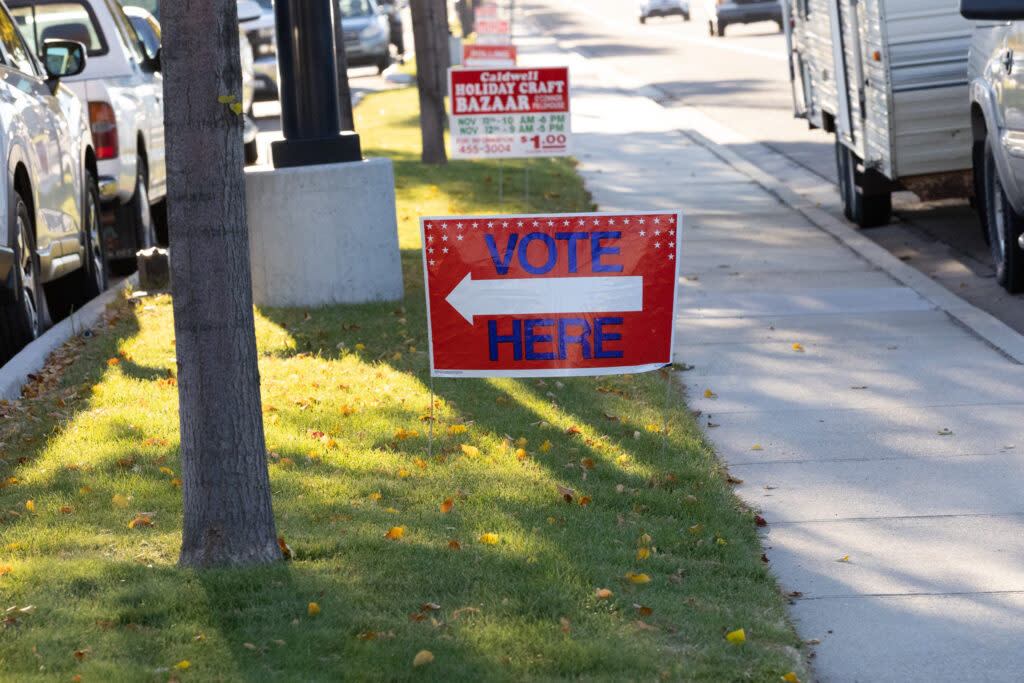Here’s what to know about the May 23 Idaho Democratic presidential caucus

A "Vote Here" sign outside O'Connor Field House in Caldwell, Idaho, on November 8, 2022. (Otto Kitsinger for Idaho Capital Sun)
Idaho Democrats will hold their presidential nominating caucus from 5-8 p.m. local time on May 23, giving Democrats across the state the chance to vote for their party’s presidential nominee.
The caucus is new this year, and the Democrats are staging their caucus two days after the May 21 primary election. Idaho Republicans already conducted their presidential nominating caucus on March 2.
Although President Joe Biden secured enough delegates to clinch the Democratic Party’s nomination for president back in March, there are six candidates who have qualified to appear on the ballot for the Democratic caucus in the Gem State, said Jared DeLoof, executive director of the Idaho Democratic Party.
Those candidates are
Biden
David Olscamp
Jason Palmer
Armando Perez-Serrato
Dean Phillips
Marianne Williamson
In addition to their choice of presidential candidates, Democrats will also vote on delegates to attend the Idaho Democratic Party’s summer convention, which runs June 22 through June 23 in Moscow, DeLoof said.
GET THE MORNING HEADLINES DELIVERED TO YOUR INBOX
What to expect at the Democratic presidential caucus
The locations of Democratic caucus sites are posted online. There is at least one caucus site in every county and voters must attend a caucus site in the county they are registered to vote in. For counties that feature more than one caucus site, such as Ada and Canyon counties, voters may go to any site they wish in their home county, DeLoof said.
Need to get in touch?
Have a news tip?
In order to vote in the Democrats’ caucus, voters must be affiliated with the Democratic Party or be an unaffiliated voter, DeLoof said. People can register to vote or change their party affiliation to the Democrats at the caucus site. But voters cannot participate in the Democrats’ caucus if they already participated in the Republican’s presidential caucus or any other presidential caucus this year, DeLoof said. Additionally, interested voters who are only 17 years old when the Democratic caucus takes place will be allowed to register to vote and participate in the caucus if they turn 18 before the Nov. 5 general election. Voters are also allowed to bring their younger children to accompany them and observe the caucus.
The caucus will begin at 5 p.m. local time and will end at 8 p.m. DeLoof said anyone who is in line for a Democratic caucus at 8 p.m. will still be allowed to vote.
Once voters are checked in at their caucus site on May 23, they will be given a ballot to fill out and hand in, and then may leave if they wish. DeLoof said there will only be one round of voting, and the goal is for the entire process to take less than 10 minutes.
“The thing we have prioritized more than anything else is voters participating in ways that will be familiar to them and with the least amount of obstacles as possible,” DeLoof said in a telephone interview.
Democrats would have preferred a presidential primary election, not a caucus
The presidential caucus is new for Idaho voters this year because last year the Idaho Legislature seemingly unintentionally eliminated the presidential primary elections.
In 2023, the Idaho Legislature passed House BIll 138, which supporters said was designed to move the state’s presidential primary election back from March to take place in May with the other state primary elections. But instead of moving the presidential primary back, House Bill 138 eliminated the presidential primary election altogether. A so-called trailer bill that was designed to correct the issue did not advance out of the House State Affairs Committee at the end of the 2023 legislative session, and legislators could not agree to a special session in late 2023 to reinstate the presidential primary election.
In response, the state’s political parties decided to conduct presidential nominating caucuses in absence of the primary election.
“We did not want this caucus system,” DeLoof said. “We tried to work with Republicans to get this fixed because a caucus, quite frankly, is not a great way for folks to be able to cast a vote. We’re not happy with the system, but we are making the best of it.”
Primary elections and caucuses are different for many reasons. One of the reasons is that caucuses are run entirely by the political parties, not the state or counties. The Republican caucus also required all voters to attend their caucus in person and there was no exception for members of the military stationed out of state, religious missionaries, people who had to work, people who were traveling, people who had accessibility issues or people who lacked transportation.
On the other hand, the Democrats offer absentee ballots to voters who cannot participate in person due to military service, disability or illness, work, child care obligations, school, the inability to travel or other reasons. Voters can request an absentee ballot online, and the deadline to request an absentee ballot is 5 p.m. Mountain Time, May 16.
“We’re trying to make it as accessible as possible and ultimately make the best of a bad situation, and we look forward to seeing everyone at these events,” DeLoof said.
Unlike the Republican caucus, news reporters will be allowed inside the Democratic caucus sites to observe and report on the process as long as they register for a credential with the Democratic Party, DeLoof said. Only registered Republicans and their children were allowed at the Republican’s caucus in March, meaning news reporters and independent observers who were not registered Republicans were not allowed to observe the GOP caucus.
The post Here’s what to know about the May 23 Idaho Democratic presidential caucus appeared first on Idaho Capital Sun.


